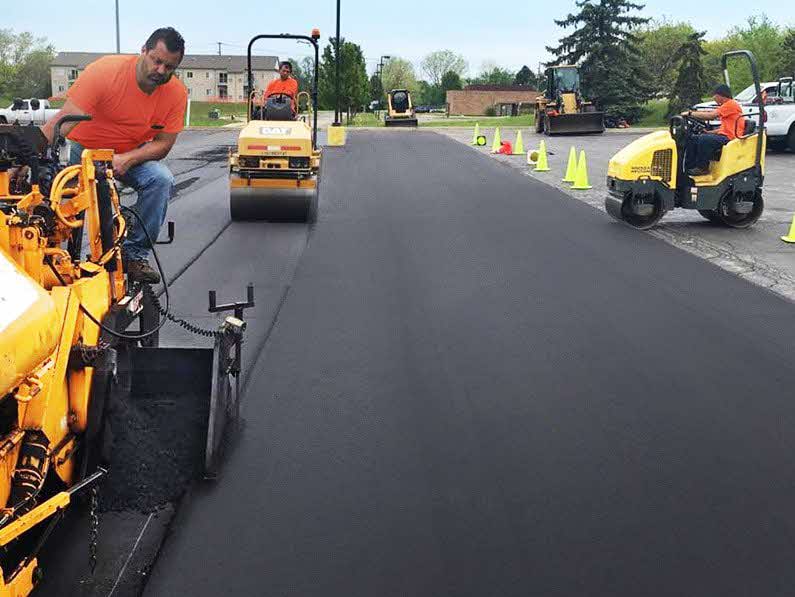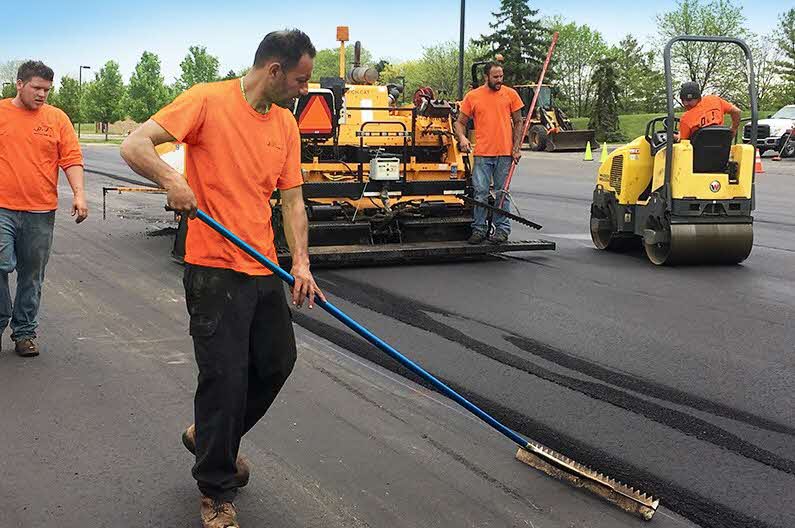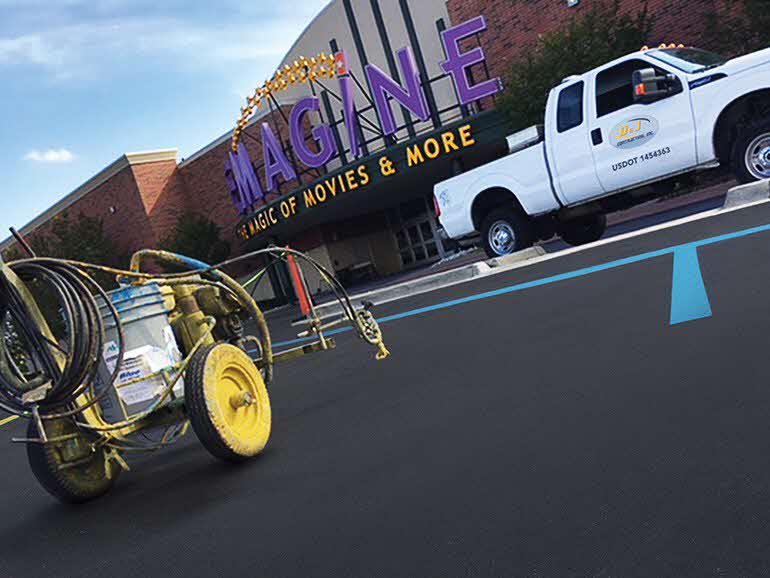Crack Repairs Eastpointe Michigan
We Are Locally Owned
& Operated For 36 Years
About Crack Repairs
Introduction
Concrete structures, including commercial properties, are so robust and reliable that they appear nearly indestructible. However, over time, they can exhibit the tell-tale signs of wear, one of the most common signs being cracks. When left untreated, even small fissures in concrete can lead to major costly repairs or replacements, making it crucial to address these issues early. Our guide today focuses on the primary keyword ‘Crack Repairs’ and its importance in commercial property maintenance. What are they and why is it crucial to repair cracks promptly and efficiently? We will delve deeper into these queries, shedding light on the critical role of ‘crack repair’ in preserving the structural stability and longevity of your commercial properties.
Identification of Cracks
The first step in the process is correctly identifying signs of ‘cracked concrete’. There is a wide variety of cracks that can affect your property, ranging from hairline cracks that are barely visible to massive fractures that pose immediate structural threats. Even minimal cracks can gradually grow over time due to various factors including weather exposure and load-bearing pressures, making it essential to regularly inspect your property for any signs of deterioration. Spotting these issues early can prevent dangerous conditions, save money, and prolong the life of your structure.
Crack Repair Methods
Once cracks have been detected, the next step is choosing the optimal ‘crack repair’ strategy. This typically involves considering the size and location of the crack, as well as the underlying cause. For smaller, superficial cracks, sealant for cracks can be effective. This product fills in the gaps and helps keep moisture, which can exacerbate cracking, out of the structure. Larger, structural cracks, on the other hand, may require more complicated repair methods, such as epoxy injections or complete replacement of the affected area.
Benefits of Crack Repair
Addressing cracks in your commercial properties brings numerous benefits. Firstly, it enhances the structure’s integrity, reducing the risk of falling debris that can cause injuries or damage other properties. It also increases the property’s lifespan by preventing water seepage, which can lead to issues like mold and structural instability. Additionally, it adds to the property’s aesthetic appeal, which can be crucial in maintaining its value.
Working with Professionals
While some minor crack repairs can be addressed with basic DIY methods, it’s often beneficial to work with professional repair services, especially when dealing with large commercial properties. Professionals have the technical skills and experience necessary to thoroughly diagnose the issue, select the most effective repair method, and execute the repair efficiently and safely.
Conclusion
To sum up, crack repair is a crucial aspect of maintaining the integrity and value of your commercial property. From identifying ‘cracked concrete’ to selecting the appropriate ‘sealant for cracks’, the entire process requires careful attention and expertise. Recognizing the various factors that can lead to cracking and the options for repair will help you make informed decisions about your property’s upkeep. These steps can mean the difference between minor, manageable repair jobs and full-scale, costly replacements.
Call to Action
Do you notice cracks in your commercial property? Our team of experienced professionals are ready to help you preserve the structural integrity of your property and maximize its lifespan. Contact us today for reliable, efficient, and proactive ‘crack repair’ services.
Contact Us Today for a FREE
Crack Repair Quote






About Eastpointe, Michigan
History
|
|
This section does not cite any sources. (June 2023)
|
The community was first settled by Irish and German immigrants in the 1830s. In October 1897, a post office was established there with the name of “Half-way”, as it was near the halfway point of the stage run between downtown Detroit and the Macomb County seat at Mount Clemens. It incorporated as the village of Halfway in December 1924 and reincorporated as the city of East Detroit in January 1929. Prior to 1924, most of the community formed a part of Erin Township. The city changed its name to “Eastpointe” after the change was approved by residents in a 1992 referendum; the name change had been proposed to remove any perceived association with the adjacent city of Detroit; the “pointe” suffix is intended to associate the city instead with the nearby affluent communities of the Grosse Pointes. The city also changed its name to give the community a sense that it was its own city with its own unique history, identity, and not an extension or branch of Detroit. Other names were also nominated for the referendum never balloted.
The city’s school district was unaffected by the municipal name change, and was called East Detroit Public Schools until 2017, when it changed the district name to Eastpointe Community Schools to align with the community name. It has one high school (Eastpointe High School), one middle school (Eastpointe Middle School), and four elementary schools. The primary district boundaries of Eastpointe Community Schools encompass the City of Eastpointe and the southeastern portion of the city of Warren.
Geography
Eastpointe is in southern Macomb County, 10 miles (16 km) northeast of Downtown Detroit and 7 miles (11 km) north of Grosse Pointe. It is bordered to the west by the city of Warren, to the north by Roseville, and to the east by St. Clair Shores. It is bordered to the south by the cities of Detroit and Harper Woods in Wayne County. Roads that follow the city borders include Beechwood Avenue (up until it reaches Stephens Road, where it switches over to Hayes) on its western border, 8 Mile/M-102 on its southern border, Beaconsfield/the southern and western bound section of the I-94 service drive on its eastern border, and roughly 10 Mile Road on its northern border.
According to the United States Census Bureau, the city has a total area of 5.16 square miles (13.36 km), of which 0.002 square miles (0.005 km2), or 0.04%, are water.
Eastpointe is generally considered to be a bedroom community. It is a relatively short drive from many other points of interest in the Detroit area. It is served by Interstate 94 (I-94) and I-696, as well as M-he in 3 (Gratiot Avenue), M-102 (8 Mile Road), and 9 Mile Road.
Demographics
| Census | Pop. | Note | %± |
|---|---|---|---|
| 1930 | 5,955 | — | |
| 1940 | 8,584 | 44.1% | |
| 1950 | 21,461 | 150.0% | |
| 1960 | 45,756 | 113.2% | |
| 1970 | 45,920 | 0.4% | |
| 1980 | 38,280 | −16.6% | |
| 1990 | 35,283 | −7.8% | |
| 2000 | 34,077 | −3.4% | |
| 2010 | 32,442 | −4.8% | |
| 2020 | 34,318 | 5.8% | |
| 2022 (est.) | 33,806 | −1.5% | |
| U.S. Decennial Census 2020 Census |
|||
2020 census
As of the 2020 census, there were 34,318 people, 13,126 households, and 8,523 families residing in the city. The population density was 6,653.4 inhabitants per square mile (2,568.9/km2). There were 13,798 housing units.
2010 census
As of the 2010 census, there were 32,442 people, 12,557 households, and 8,220 families residing in the city. The population density was 6,307.4 inhabitants per square mile (2,435.3/km). There were 13,796 housing units at an average density of 2,684.0 per square mile (1,036.3/km2). The racial makeup of the city was 65.6% White, 29.5% African American, 0.4% Native American, 1.1% Asian, 0.5% from other races, and 2.9% from two or more races. Hispanic or Latino of any race were 2.1% of the population.
There were 12,557 households, of which 34.9% had children under the age of 18 living with them, 39.9% were married couples living together, 19.5% had a female householder with no husband present, 6.0% had a male householder with no wife present, and 34.5% were non-families. 28.7% of all households were made up of individuals, and 10.7% had someone living alone who was 65 years of age or older. The average household size was 2.58 and the average family size was 3.19.
The median age in the city was 36.3 years. 25.7% of residents were under the age of 18; 8.8% were between the ages of 18 and 24; 28.6% were from 25 to 44; 25.7% were from 45 to 64; and 11.3% were 65 years of age or older. The gender makeup of the city was 48.4% male and 51.6% female.
2000 census
As of the 2000 census, there were 34,077 people, 13,595 households, and 8,959 families residing in the city. The population density was 6,678.8 inhabitants per square mile (2,578.7/km). There were 13,965 housing units at an average density of 2,737.0 per square mile (1,056.8/km2). The racial makeup of the city was 92.13% White, 4.70% African-American, 0.42% Native American, 0.87% Asian, 0.01% Pacific Islander, 0.27% from other races, and 1.61% from two or more races. Hispanic or Latino of any race were 1.33% of the population.
There were 13,595 households, out of which 30.2% had children under the age of 18 living with them, 48.6% were married couples living together, 12.3% had a female householder with no husband present, and 34.1% were non-families. 28.8% of all households were made up of individuals, and 13.8% had someone living alone who was 65 years of age or older. The average household size was 2.50 and the average family size was 3.11.
In the city, the population was spread out, with 24.5% under the age of 18, 7.6% from 18 to 24, 32.3% from 25 to 44, 19.2% from 45 to 64, and 16.5% who were 65 years of age or older. The median age was 37 years. For every 100 females, there were 94.3 males. For every 100 females age 18 and over, there were 90.9 males.
The median income for a household in the city was $46,261, and the median income for a family was $54,895. Males had a median income of $41,449 versus $28,095 for females. The per capita income for the city was $20,665. About 4.2% of families and 6.4% of the population were below the poverty line, including 8.5% of those under age 18 and 7.8% of those age 65 or over.
Government
Eastpointe is a Michigan home-rule city and operates under the council-manager form of government. The city’s mayor and four council members are elected at large to four-year staggered terms.
In 2017, Eastpointe elected its first African-American councilwoman, Monique Owens. In 2019, Suzanne Pixley, who had been mayor since 2007, did not seek reelection after her third four-year term. Councilwoman Monique Owens succeeded Pixley as mayor in 2019, becoming the first African-American mayor of Eastpointe and also making the city the first in the county to elect an African-American as mayor.
Owens was unseated in the 2023 mayoral primary. Her tenure as mayor was marred by multiple scandals, including a lawsuit alleging that she violated residents’ First Amendment rights and a criminal charge for alleged false statements on a grant application. Residents also objected to police reports she made against critics, her failure to file financial disclosure statements, her heated tirades against residents and other officials during meetings, and her lack of support for the LGBT community.
On November 7, 2023, voters chose former city council member Michael Klinefelt as mayor. Eastpointe voters also elected incumbent Harvey Curley and newcomer Margaret Podsiadlik to the city council. The three were sworn in the following Monday.
Discrimination lawsuit
After a racial discrimination lawsuit was brought against the city regarding its election of all city council members through Plurality-at-large voting, alleging that the plurality-at-large system discriminated against African-American voters and violated Section 2 of the Voting Rights Act, the city settled the lawsuit with the United States Department of Justice in June 2019 by agreeing to switch to single transferable vote for the at-large election of city council members for the November 2019 municipal election.
Beginning with the November 2019 election, ranked choice voting was used on the city council ballot, making Eastpointe the first municipality in Michigan to adopt ranked choice voting.
First Amendment lawsuit
In 2022, four Eastpointe residents filed a federal lawsuit against the City of Eastpointe and Mayor Monique Owens alleging violations of their First Amendment rights. The plaintiffs alleged that Owens had interrupted and censored their remarks during time allotted for public comments at council meetings and engaged in viewpoint discrimination against them. The complaint requested that the city amend its public comment rules and sought damages from the mayor.
On December 8, 2022, a federal judge issued a preliminary injunction prohibiting Owens from shouting down speakers or restricting the subject matter of their remarks. The order is to remain in effect until the case is resolved or the court orders otherwise.
The lawsuit stemmed largely from an incident at the council’s September 6, 2022, meeting, during which Owens interrupted or talked over three residents who had attempted to speak. As Owens argued with one of the residents, the other four council members walked out, ending the meeting.
The plaintiffs are represented by attorneys from the Foundation for Individual Rights and Expression (FIRE), a First Amendment advocacy group.
LGBT community relations
In 2019, the City of Eastpointe became one of the first municipalities in Macomb County to recognize Pride Month, despite the opposition of Mayor Monique Owens, who said that Eastpointe has “always accepted everybody”. On May 16, 2023, the Eastpointe City Council again voted on a Pride Month resolution, but it failed in a 2-2 vote due to opposition from Rob Baker and Stacy Cobb-Muñiz. Owens was absent from the meeting. The council’s decision prompted sparked a protest at City Hall.
Mayor’s criminal conviction
On September 28, 2023, Eastpointe’s departing mayor, Monique Owens, pleaded no contest to a misdemeanor charge of making a false statement. The case, which was initially charged as felony false pretenses, stemmed from her application for a CARES Act grant for her business. The application stated that her business, Naturally Funny Talent Agency, was 51 percent of more owned by veterans and that it had 100-249 employees. Upon investigation, the Macomb County Sheriff’s Office determined that Owens had had never served in the military and that she was the sole employee of the company. On November 9, 2023, Owens was sentenced to six months of probation, 100 hours of community service, and $725 in court costs.
Education
Eastpointe Community Schools operates public schools in Eastpointe and includes most of the municipality. The southeastern corner of the city is instead within South Lake Public Schools. Koepsell Elementary of the South Lake district is in Eastpointe.
Eaton Academy, a charter school, is in Eastpointe. It is located on the grounds of the former St. Veronica School of the Roman Catholic Archdiocese of Detroit.
St. Thomas Lutheran Church formerly operated the St. Thomas Lutheran School. A drop in enrollment occurred after the Great Recession in the late aughts. It closed in 2015. The Great Start Readiness Program began renting the facility after its closure.
Higher education
Eastpointe is also served by Macomb Community College’s South Campus, which is located in Warren, two miles north of the city.
Wayne County Community College District’s Mary Ellen Stempfle University Center is located in Harper Woods, just across 8 Mile from Eastpointe.
Contact Us Today for a FREE
Crack Repair Quote
Our Crack Repair services are available in Eastpointe as well as all of Macomb County.
Our dedicated team at D&J Contracting Inc is at-the-ready to provide you with great customer service and first class Crack Repair services. Reach out to us at (586) 954-0008 to discuss your Crack Repair needs today!